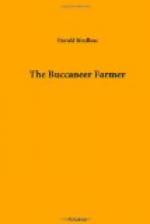In the meantime, Grace walked home thinking hard. Kit was Railton’s friend, but he had used some tact, until she forced him to tell her the truth. This, however, was not important, because she had got a jar. It looked as if Osborn had consented to a cruel plot; a landlord ought to help his tenants and not take advantage of their need. She tried not to blame him; he had a bad agent, who used a dangerous influence. She must try to protect him from the fellow and, in a way, from his own carelessness.
After all, it was, for the most part, carelessness, because he did not know Hayes as she knew him. Still, she had not undertaken an easy thing and she braced herself as she went up the steps of the new terrace. Grace hated the terrace. It was the price they, the Osborns, had taken for a shabby deed, and for which poor people and hard-worked women paid. Grace knew about the extra dust that peat fires caused and how often the bread was spoiled.
When she entered the library Osborn was studying some documents. He looked up impatiently, and she said, “I was at Mireside. Railton’s no better and is much disturbed about his lease.”
“Not more disturbed than he deserves!” Osborn rejoined. “The fellow has been getting slack for some time; he sold his store sheep imprudently and let the flock run down.”
“He has been ill and the weather has been bad for some years.”
“Exactly. A cautious man provides for bad years; he knows they will come.”
Grace was surprised her father did not see that his statement had a humorous touch, since improvident extravagance was his rule; but it was obvious that he did not.
“One cannot save much money when rents are high and prices are low.”
“Do you know much about these matters?” Osborn asked.
“I have heard the farmers talk. Sometimes I ask them questions.”
Osborn frowned. “You talk too much to the farmers. I don’t like it. You know this.”
“Well,” said Grace, “I think you ought not to break Railton’s lease.”
“Why?”
Grace hesitated. She began to see that Osborn could not be moved, but she had undertaken to plead Railton’s cause.
“He’s an old man and has been at Mireside all his life. He has worked hard and always paid his rent. Now he’s ill and in trouble, it would be shabby to turn him out because there’s a risk—it’s only a risk—that we might lose something by letting him stay.”
“You don’t seem to understand a landlord’s duty,” Osborn rejoined. “He is, so to speak, the steward in charge of the estate; it belongs to the family and is not his. He must hand it on in good order and this means he cannot indulge his sentimental impulses. If he keeps a bad tenant from pity, or because he’s afraid to seem harsh, he robs his heir.”
Grace knew there were other, and perhaps worse, ways of robbing one’s heir; but she said, “Aren’t you taking Hayes’s view that Railton is a bad tenant? After all, we are responsible.”




